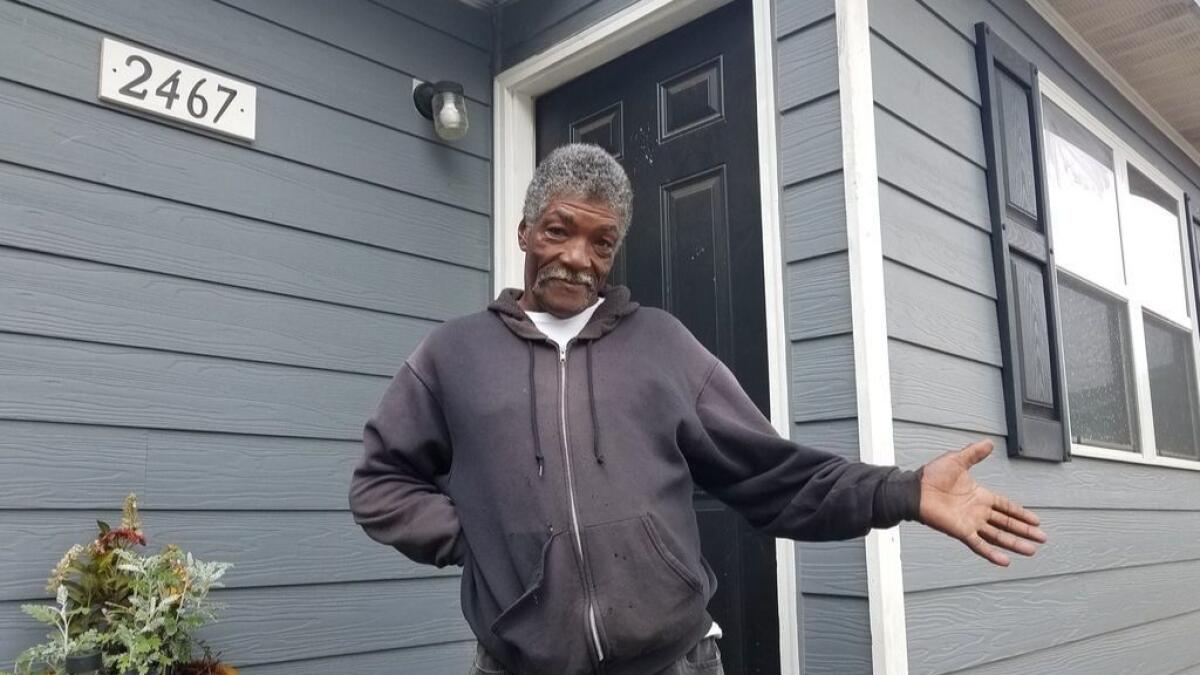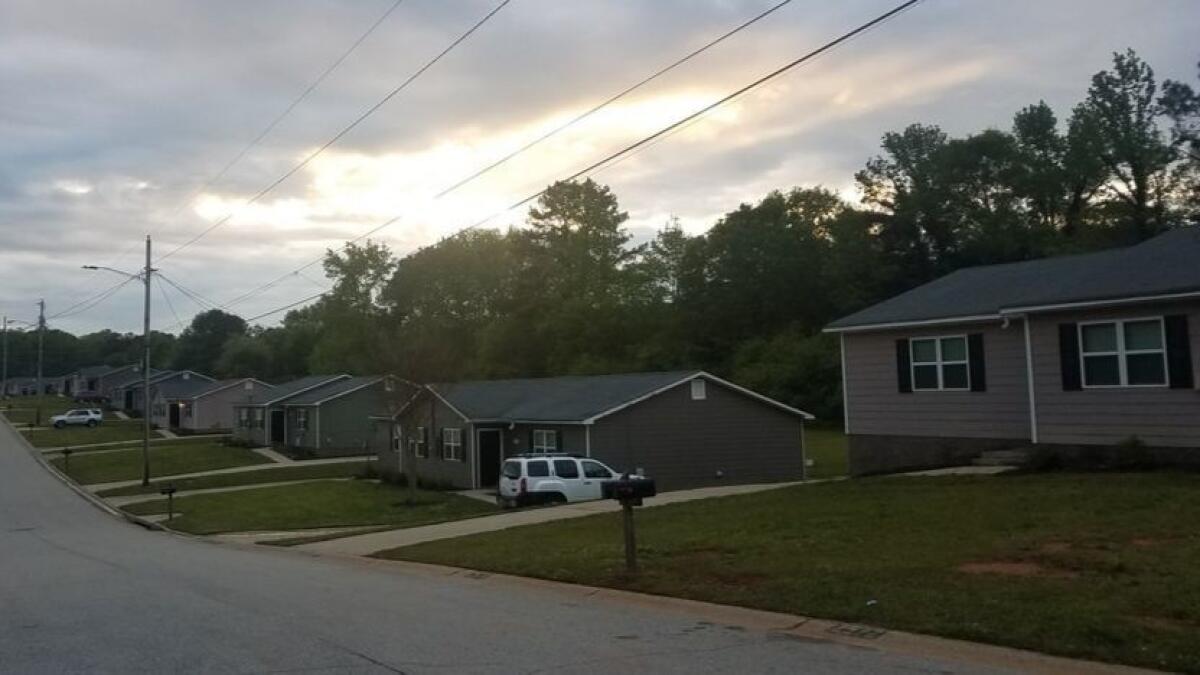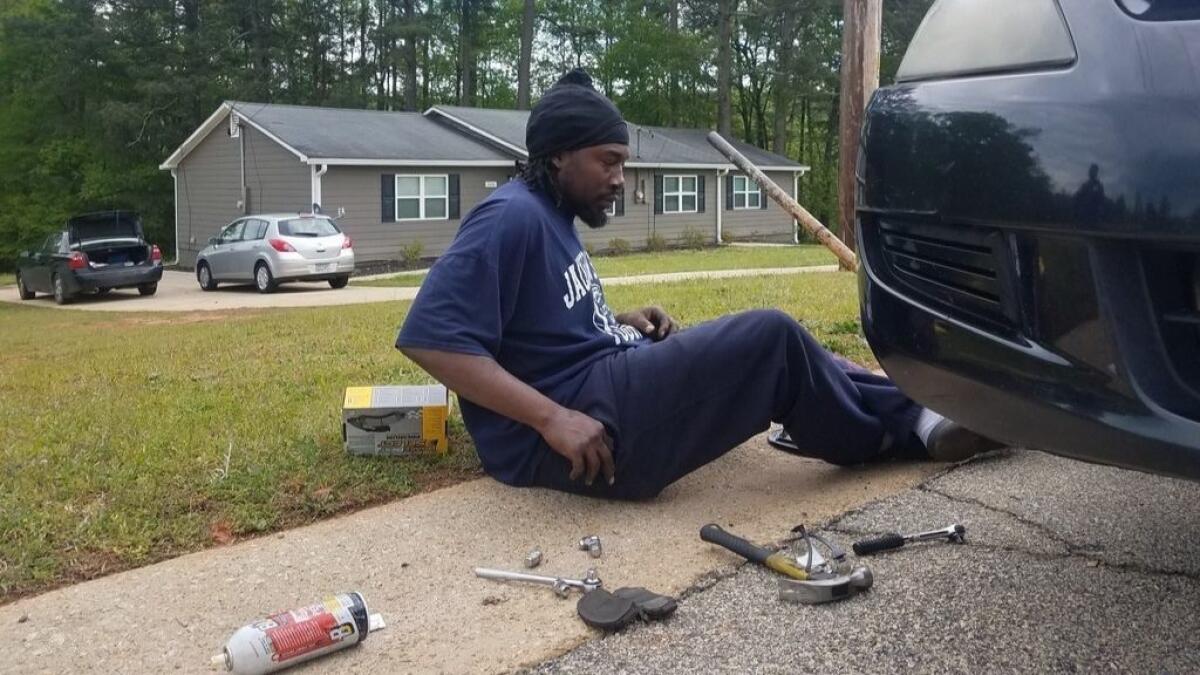In Georgia, Sean Hannity is just another landlord hiking the rent

- Share via
Reporting from Lithia Springs, Ga. — Fox News host Sean Hannity is one of the most recognizable media figures in America. He has the ear of President Trump. His show is one of the most popular on cable news.
But you wouldn’t know it from talking to the tenants at the Meadows, a modest neighborhood of duplexes in Lithia Springs, about 15 miles west of downtown Atlanta.
For the record:
5:55 p.m. April 28, 2018An earlier version of this story said that rents at a property owned by Sean Hannity had increased 10% a year from 2013 to 2018. They increased 50% since 2013.
“Who?” Keith Jones, a 62-year-old pipe layer, said blankly in an interview this week.
“I don’t know who he is,” said Sherrice Rouster, a 38-year-old self-employed childcare worker and tax preparer.
Hannity is their landlord, and he’s raising their rent — a lot.

Journalists uncovered Hannity’s extensive rental holdings in Georgia and Alabama this week after he said he had consulted with the president’s lawyer, Michael Cohen, about real estate issues.
Through a series of limited-liability companies — each using the name SPMK, followed by Roman numerals — documents revealed that Hannity is the owner of apartment complexes and houses worth tens of millions of dollars and capable of housing hundreds of people.
Some observers tittered at the revelation that Hannity, a vocal critic of government assistance, had accepted taxpayer help from the Department of Housing and Urban Development to insure the mortgages for at least two of his rental complexes.
But there was little unique about the way Hannity built his empire, using limited-liability companies, as many wealthy people do, to shield his identity while legally buying properties. It’s the same story of how Wall Street became a major Main Street landlord — and began jacking up rents.
In 2012, Hannity joined a wave of big-money investors to sweep in after the Great Recession’s housing crash, often snatching up foreclosed properties across the U.S. at bargain-bin prices.
“Historically, the typical single-family landlord was a local person who owned a few houses,” said Julia Gordon, executive vice president of the National Community Stabilization Trust, an anti-blight nonprofit organization. “They would basically oversee things like collecting the rent, do home repairs themselves, or employ a handyman to do home repairs. It was a very mom-and-pop type-industry.”
Today, Gordon said, it seems like rental homes “are almost always owned by somebody whose last name is ‘LLC.’ ”
The rise in out-of-town ownership also coincided with the rise of companies like Renters Warehouse, a national property-management service that received a celebrity endorsement from Hannity.
The duplexes at the Meadows, in Lithia Springs, were built on a former cow pasture in the 1980s by Paul Robinson Jr., a local home builder and small businessman. The subdivision has more than 100 units, which average about 944 square feet.
It was an investment for his retirement, Robinson said in an interview this week. Living next door, he adopted a hands-on approach, taking on much of the day-to-day work of cleaning up, painting, replacing carpet and collecting rent.
Robinson didn’t raise the rent much, he said, because many of his tenants had lived there for 10 or 20 years and were elderly.
But after the financial crisis hit, Robinson lost the complex, he said, when his bank went under and the new bank demanded that he pay $500,000 of the $2.5 million loan.
With 112 duplex units bringing in a cash flow of about $60,000 a month, Robinson said, he had $500,000. But it was only a one-year deal and, having heard of horror stories of banks upping demands each year, he decided to let the bank foreclose on the property.
Eventually, the loss of rental income led Robinson to lose his own home too.
Then, in March 2013, an LLC named SPMK XII Meadows bought the property from Robinson’s bank for $3.15 million.

There was nothing in the company’s registration records indicating its owner was a famous TV host. The complex is managed by Henssler Property Management, which is co-owned by another LLC called SPMK II.
After Hannity was named as the owner of the SPMK companies this week, he defended his holdings.
“It is ironic that I am being attacked for investing my personal money in communities that badly need such investment and in which, I am sure, those attacking me have not invested their money,” Hannity said in a statement. “The fact is, these are investments that I do not individually select, control, or know the details about; except that obviously I believe in putting my money to work in communities that otherwise struggle to receive such support.”
Since SPMK took over, the homes got renovated. Old carpets were replaced with hardwood floors; kitchens got new cabinets and appliances. Outside, fresh siding went up and flower beds were filled with uniform rows of privet and pink roses.
But longtime tenants of this predominantly blue collar, African American neighborhood also said their monthly payments on their small two-bedroom apartments had gone up 50% over the last five years, increasing from about $650 to as much as $1,000.
Rents are rising nationally. But a rate increase of roughly 50% since 2013 is surprisingly high, about double the rate of rentals in the Lithia Springs area, said Dan Immergluck, a professor at Georgia State University’s Urban Studies Institute, who specializes in neighborhood change and housing markets.
“That’s a lot, and it’s fast,” Immergluck said, noting that even if Hannity spent thousands of dollars on renovations for each unit, “he is probably doing quite well” in terms of profit.
“It’s not really affordable,” said Rouster, a Meadows resident, as a pair of toddlers waddled around her tiny living room.
“He’s not helping. He’s making money,” said Iyabo Balogun, a 51-year-old home-helper who works with the elderly and lives in a unit with her niece and her two children. “If he was helping, he wouldn’t be increasing rents every year.”
Olander Ragan, a 29-year-old warehouse forklift truck driver, is taking on extra jobs – cutting grass every Saturday and fixing cars to meet his monthly $850 rental payments for the cramped apartment he shares with his wife and daughter. Next month, his payment will jump to $950 a month.
“They wanted to raise it to $1,000, but I told them I’m not going to pay that much,” he said, as he sat cross-legged on the asphalt outside his tiny duplex, surrounded by a hammer, ratchets and lug nuts as he installed new brake pads on a Honda Accord.

For Ragan, his prospect of financial security is bleak, whether or not Hannity is his landlord.
“I’m a black man living in America. Doesn’t matter who my landlord is. Doesn’t matter if he’s a racist S.O.B.,” Ragan said bitterly as his friend watched him work. “I’ve been a slave all my life. What am I supposed to do?”
An attorney who handles Hannity’s real-estate holdings, Christopher Reeves, did not respond to a request for comment.
Even if they felt the odds were against them, many residents said they hoped to eventually own their own place.
“I ain’t planning on being around here much longer,” Ragan said. “I don’t want to keep paying rent for something I can never own. It’s a waste of my time.”
While Robinson, the builder of the complex, still thinks the banks treated him unfairly — “They killed all the little guys” — he has no hard feelings against the current owner of his property.
“The rents needed to go up,” Robinson said. “I should have gone up on them, but we all knew each other.”
Of Hannity’s decision to snap up the property out of foreclosure, Robinson added: “If he had the money to buy all that during the bad times, that’s how you get ahead. I wish I’d have had that myself, but it just didn’t work out that way.”
Now working as a property manager more than 100 miles away in Pell City, Ala., Robinson has not given up on real estate. Even with more big corporations swooping in to buy properties, he said, there are still deals to be had.
“It’s a free market,” he said. “They have opportunities. There’s also opportunities for a little guy like me, to kind of move around and manipulate in between the big guys. … There are opportunities for all of us.”
Pearce reported from Los Angeles and special correspondent Jarvie reported from Lithia Springs.
Matt Pearce is a national reporter for The Times. Follow him on Twitter at @mattdpearce.
More to Read
Sign up for Essential California
The most important California stories and recommendations in your inbox every morning.
You may occasionally receive promotional content from the Los Angeles Times.














